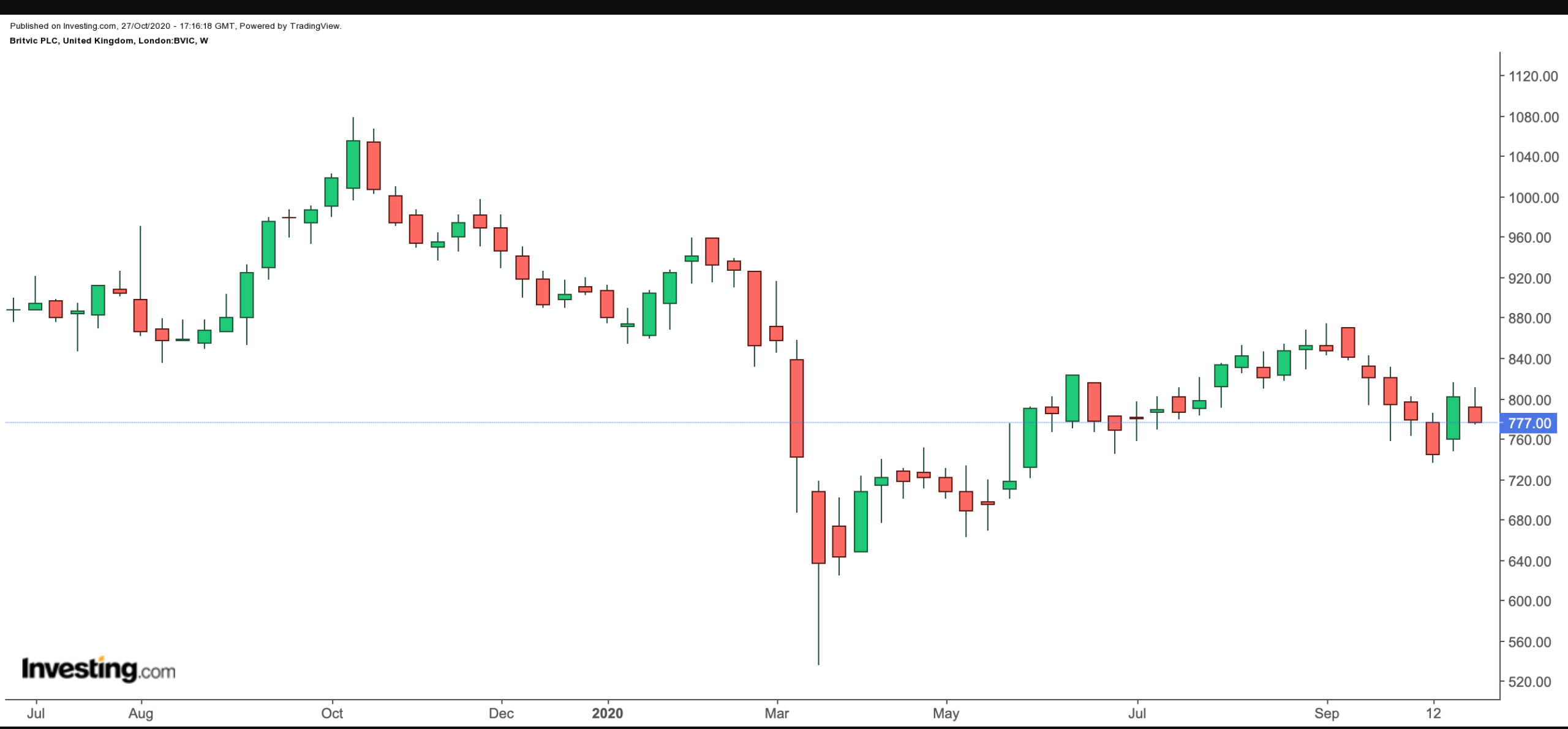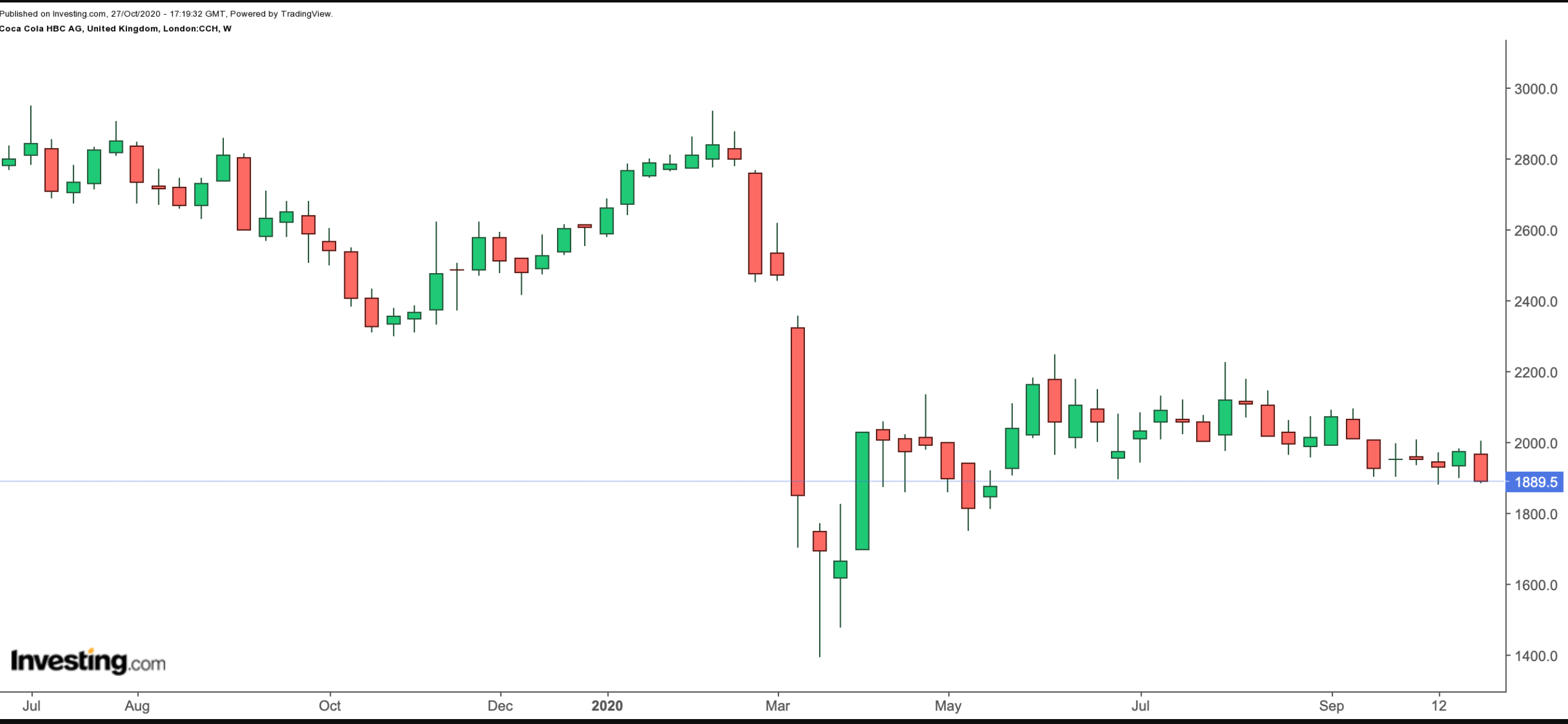Investors worldwide have been getting jittery in recent weeks. Where to invest in the final quarter of the year as increased volatility is a pressing concern for many market participants.
As a result, even well-established defensive plays have seen their share prices take a hit in 2020, creating better opportunities for investors looking to buy while stock prices are lower. Below we'll take a closer look at 2 FTSE-member drink manufacturers that fit the bill:
Britvic
Most UK-based market-watchers would be familiar with the FTSE 250 member Britvic (LON:BVIC) (OTC:BTVCY), whose history goes back to the 19th century.
Its soft drinks include Robinsons, Tango, Fruit Shoot and J2O. The group also has exclusive rights to make and distribute PepsiCo's (NASDAQ:PEP) global brands in the UK. Earlier in the month, its the franchise bottling agreement with PepsiCo was extended another 20 years.

Britvic's brand names provide the group with a loyal customer base and pricing power. Currently, the company is the largest supplier of branded still soft drinks in the UK, as well as the number two supplier of branded carbonated soft drinks domestically. Through franchising, export sales and licensing, it has also increased its global reach. Current operations outside the UK extend to Ireland, France and Brazil, among others.
On Oct. 20, Britvic announced, "its intent for all plastic bottles in GB to be made from 100% recycled plastic (rPET) by the end of 2022 – three years earlier than originally planned, and ahead of the previous target of 50%."
At the time, management also provided a trading update and said revenue through the peak summer period came in “better than expected.” However, uncertainties due to the potential effects of the pandemic on the UK hospitality sector remain.
In recent years, the group has been innovative, offering a range of drinks for various groups of consumers whose dietary needs and wants may differ, such as the 18-24-year-olds, the under-35s, as well as the over-50s., putting special emphasis on the low/no-added-sugar portfolio. Management has defined its strategic priority as "Healthier People, Healthier Planet.”
Over the past decade, Britvic has delivered stable long-term shareholder returns, rising from around 470p in October 2010 to the current price of 777p ($20.81 for U.S.-based shares). That is a compound annual growth rate (CAGR) of more than 5%. Its current dividend yield for UK-based shares stands at 2.7%.
However, so far in 2020, BVIC stock is down about 12%. Its forward P/E and P/S ratios stand at 15.04 and 1.45. By comparison, PEP stock is up about 1% in 2020 and its forward P/E and P/S ratios are 22.57 and 2.81.
Given its strong brands, we regard Britvic as a defensive stalwart. Thus, this year's weakness in the stock price is possibly an opportunity to pick up some of the shares.
Coca Cola HBC
FTSE 100 member Coca Cola HBC (LON:CCH) (OTC:CCHGY) bottles and distributes Coca-Cola (NYSE:KO) products in close to 30 countries on three continents. Some of the brands include Coca-Cola, Coca-Cola Zero, Schweppes, Costa Coffee, Fanta, Sprite, Powerade and Cappy.

From the Republic of Ireland in the west, to the Pacific coast of Russia in the east, and to Nigeria, its most southerly market, the company serves more than 600 million consumers. In 2019, total revenue was slightly over €7billion (£6.34 billion or $8.28 billion).
The Zug, Switzerland-headquartered group divides its markets into three segments:
- Established markets (contributed 36% of net sales revenue in 2019);
- Developing markets (contributed 19% of net sales revenue in 2019);
- Emerging markets (contributed 45% of net sales revenue in 2019).
However, in 2020, Coca-Cola HBC has taken a hit to its profits. The company provided half-year results in August. Revenue fell by 14.7% YoY, with volumes down 9.2%. The declines were largely due to lockdowns in many countries, which led to decreased out-of-home spending.
CEO Zoran Bogdanovic said:
“Our fast, decisive actions ensured that our supply chain was uninterrupted, and our profitability protected during a very challenging Q2… Coca-Cola HBC is a resilient business, well-positioned to adapt as markets reopen, emerge even stronger and win in the new normal.”
Year-to-date, the shares are down about 18%. On Oct. 27, CCH closed at 1,889.5p ($24.80 for U.S.-based shares) and supports a dividend yield of 2.97%. Forward P/E and P/S ratios stand at 16.23 and 1.22. By comparison, KO stock is down 9% and its forward P/E and P/S ratios are 22.83 and 6.43.
Coca-Cola HBC is expected to release Q3 numbers on Nov. 11. Between now and then, there may be more volatility in the share price with a potential downward bias. Yet, we’d look to buy the dips in CCH stock.
